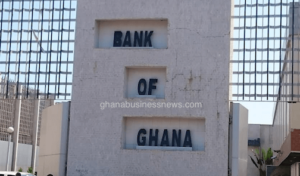As Ghana banking sector remains stable, Bank of Ghana keeps policy rate at 29%
 The Bank of Ghana Monetary Policy Committee has maintained the policy rate, the basic interest rate at 29 per cent.
The Bank of Ghana Monetary Policy Committee has maintained the policy rate, the basic interest rate at 29 per cent.
In a press statement, the central bank says broadly, the banking sector among other things, remains stable, despite the elevated credit risks.
It noted that bank’s liquidity and profitability positions have continued to improve, indicating that out of a total of 23 banks, more than half are fully capitalised and have no need for recapitalisation.
“Most of the outstanding banks have met more than two thirds of the required recapitalisation over a three-year period within one year as at the end of 2023,” it said.
According to the Governor of the Bank, Dr Ernest Addison, fiscal policy implementation so far has been broadly consistent with targets under the IMF ECF-supported programme.
“Although the primary fiscal balance target for 2023 was attained, the fiscal assessment is made on commitment basis. This will require vigilance to ensure that commitment control is effective in 2024. Revenue flows in the first two months of the year are lower vis-a-vis targets, and expenditures have been fast-paced driven largely by clearance of arrears in the energy sector. It is expected that revenue flows will pick up in March as the deadline for filing tax returns in April approaches,” he said.
He indicated that, after decelerating sharply in 2023, the pace of disinflation has slowed in the first two months of the year.
“Although inflation rose slightly in January 2024 and edged down in February, the latest inflation forecast suggests a slightly elevated profile from the possible upward revision in transport fares, adjustment in utility tariffs, higher ex-pump prices, and some pass through of exchange rate depreciation. Overall, risks to inflation are slightly on the upside and will require close monitoring,” he said.
Dr Addison said given these considerations, the Committee decided to maintain the Monetary Policy Rate at 29.0 per cent.
He also said in the domestic economy, the growth outturn for 2023 was stronger relative to target.
“The fourth quarter GDP growth of 3.8 per cent was driven by all three sectors. The updated Composite Index of Economic Activity also improved further in January, following the upturn in December 2023, affirming the rebound in economic activity. This was supported by broad improvements in sentiments, amid improvement in the Purchasing Manager’s Index reflecting some uptick in business purchasing activity and new orders. Private sector credit, however, remained sluggish explained by the risk aversion of banks as asset quality weakened over the period.
External sector conditions remain positive, with improving reserve buffers. This notwithstanding, the exchange rate came under strong demand pressures in the first few months of the year. Looking ahead, however, inflows from the World Bank, the tight monetary policy stance, and a weaker US dollar from potential policy rate cuts in the US, are expected to support the relative stability of the Ghana cedi,” he said.
By Emmanuel K Dogbevi
